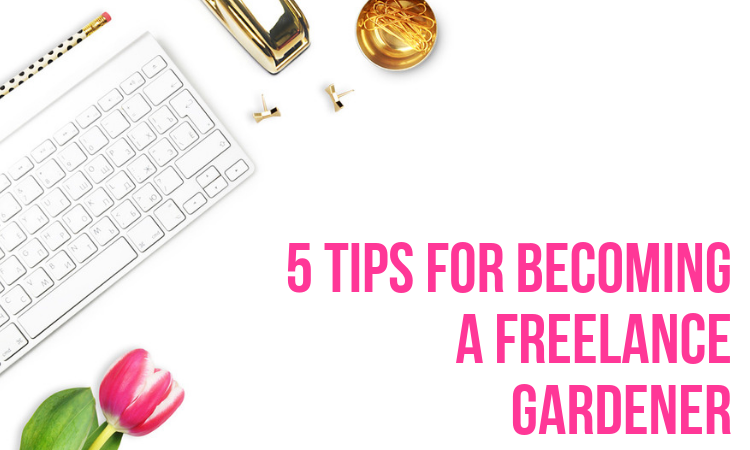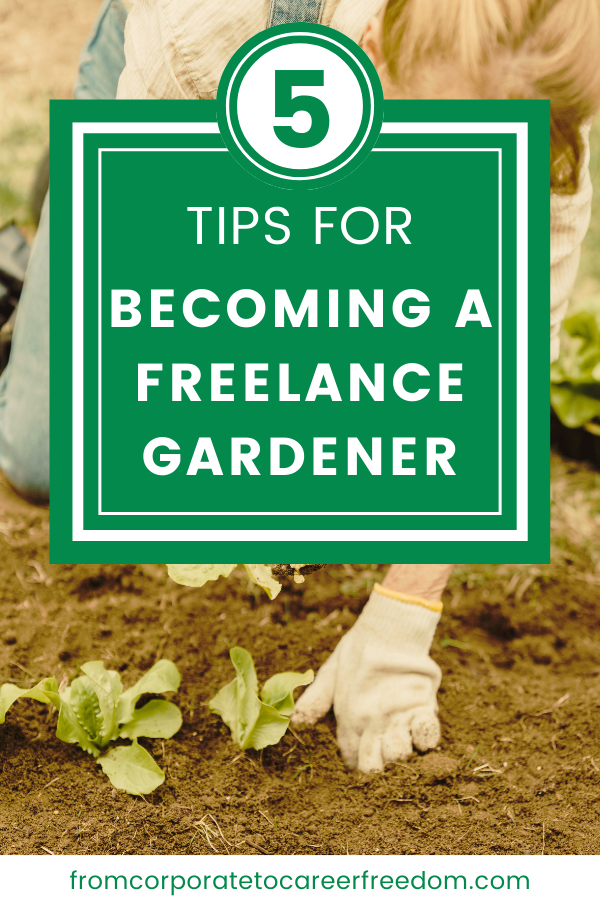Researchers have shown that a few things have a positive influence on our happiness levels. One of them is having pride in our work; another is freedom. One that’s less commonly discussed but which is important is being outdoors; just fifteen minutes of being in nature is enough to boost our mood. So what if there was a job that combined all of these things? Well, there is, as it turns out. Read on to learn the five top tips for becoming a freelance gardener.
This is a contributed post. Please refer to my disclosure for more information.
1. Know Your Stuff
Gardeners have a deep knowledge of their craft. Here is how to do that.
Check Your Current Skillset
You’re not going to jump straight into being a freelance gardener, of course. You’ll likely have years of experience under your belt as a keen enthusiast. There’s a big difference between toying around in your own garden and getting paid by someone else to improve theirs, however. Before you embark on this journey, make sure you really do know your stuff. You don’t want to be on your first job and realise that you didn’t know as much as you thought you did. Think of every problem that you might encounter, and make sure you can come up with a solution.
Improving Your Gardening Knowledge
Transitioning from a gardening enthusiast to a professional gardener means elevating your skills. There are several different ways of doing this. Start by deepening your understanding of garden design and landscape gardening. Engaging with professional bodies like the Royal Horticultural Society can help. They can provide access to resources and courses that help in gaining formal qualifications. These credentials enhance your credibility. Plus, they boost your confidence in handling different types of plants and outdoor spaces.
A skilled gardener should be familiar with the entire growing season. They know precisely when and what to plant for a beautiful garden. Consider specialising in certain areas. That could include lawn care, water features, or raised beds to offer additional services. Regularly update your knowledge about new gardening techniques. You should also learn about types of pesticides and garden goods. Learn from featured articles in gardening magazines.
Gaining Relevant Experience
Dive into the world of gardening head-first by lending a hand in the gardens of friends and neighbours. This isn’t just about getting dirty – it’s where your passion meets practice. Every garden you touch teaches you something new, from mastering the right plants for every shade to bringing a landscape design to life. Why not join a local gardening group? It’s a brilliant way to meet gardening gurus who can share their wisdom and tricks of the trade. And if you’re looking for an insider’s view on the latest in green spaces, snagging a part-time gig at a garden centre is golden. It’s the perfect blend of learning and earning, setting you on the path to becoming a standout freelance gardener.
2. Get the Right Equipment
You’ll need to invest in some equipment before you can get started your own business. Here’s what to consider.
Tools and Vehicles
You’re going to need more than what’s in your shed if you’re going to be working on other people’s gardens. The reason is that your tools are designed for the conditions of your garden; someone else’s yard might be completely different. So you’ll want to invest money into making sure you have every tool that you might need. You’ll also have to think about how you’re going to transport your items around. A reliable vehicle and a trailer that has new trailer brakes will be essential; when you’re spending so much of your time on the roads, you need to ensure that your transport is as safe as possible. It’ll be getting all of the tools that take up the bulk of your start-up cash.
Leveraging Financial Resources for Equipment
When it’s time to gear up with essential gardening tools, understanding your financial options can make a big difference. Looking into small business grants tailored for green spaces and sustainable outdoor work could offer the funding you need without dipping into personal savings. Crowdfunding, a great way to engage community support, can also fund your dream job as a freelance gardener. Don’t overlook small business loans, particularly those with favourable rates for eco-friendly projects. These avenues can provide the capital required to equip yourself with everything from ergonomic shovels to state-of-the-art lawnmowers, essential for any garden design and landscape project.
Smart Shopping for Gardening Gear
Assembling a quality toolkit on a budget requires smart strategies. Prioritise acquiring essential gardening tools that blend durability with versatility, focusing on items that endure the rigours of landscape gardening. Take advantage of end-of-season sales and online discounts to purchase professional-grade equipment at a fraction of the cost. Exploring second-hand markets can lead to significant savings on well-maintained, high-quality tools vital for outdoor work. Furthermore, tapping into a local gardening community may reveal opportunities for tool sharing, reducing the need for immediate, full-scale investments. By prioritising and being resourceful, you can secure the necessary tools to create beautiful gardens without overspending, ensuring your gardening business remains financially healthy from the start.
3. Finding Clients
Success in your new freelance gardening business depends on winning customers. Here’s how to do that as a self-employed worker.
Friends, Word of Mouth, and Advertising
Once you’ve got everything you need, you’ll need to begin finding clients. This is going to take some time; it’ll start out with friends of friends and other word-of-mouth referrals, though you’ll want to advertise your local gardener services, too. The key thing is to avoid getting too focused on the number of clients you have. They will come. In the early days, just focus on doing a great job at a reasonable hourly rate.
Leveraging Social Media and Online Platforms
In today’s digital world, your online presence can be a game-changer in attracting new clients. Create engaging profiles on social media platforms like Instagram and Facebook, where you can showcase your garden transformations and share gardening tips. Regular posts featuring before-and-after shots, garden design ideas, and seasonal gardening advice can capture the attention of potential clients. Additionally, listing your services on online marketplaces and local business directories can increase your visibility. Remember, consistent, quality content that highlights your expertise in creating beautiful outdoor spaces can turn followers into clients.
Networking and Community Engagement
Don’t underestimate the power of community engagement in finding new clients. Attend local gardening events, workshops, and home improvement expos to network with potential clients and other professionals in the field. Joining a local business association or a gardening club can also provide opportunities for referrals and collaborations. Offering to conduct free workshops or garden consultations in your local area can not only boost your visibility but also establish you as a trusted expert in the community. Through active participation and building genuine connections, you can create a strong referral network that supports your business growth.
4. Account for Low Seasons
Some people worry that gardening is a seasonal trade. While that may be true, there are things you can do to counter it.
Think About Your Finances
You’ll need to be aware that you’re not always going to have work. Very few people will employ a gardener in the middle of winter, for instance. As such, you’ll want to make sure you’re putting enough money away to ride out these lean months. Create a revenue goal for each month so you have enough to cover you during winter.
Diversifying Your Income with Gardening Expertise
Navigating the off-season as a self-employed gardener requires creativity and a strategic approach to ensure a steady income. One effective strategy is to offer garden consultancy services. This role allows you to leverage your expertise in gardening skills and landscape design to advise others on creating their dream outdoor spaces. Additionally, consider writing feature articles for gardening magazines or blogs, which not only highlight your knowledge but also keep you connected with the gardening community and potential customers.
Another avenue to explore is conducting workshops or seminars at local garden centres or community spaces. These sessions can cover a range of topics, from sustainable gardening practices to the basics of landscape architecture, offering valuable practical advice. Using financial management tools like the CountingUp app can help you monitor these new income streams, ensuring your gardening business remains vibrant even during quieter months. Embracing these diverse methods not only showcases your versatility as a gardener but also secures your financial stability year-round.
5. Get Covered Before Becoming a Freelance Gardener
Don’t forget that your business is your livelihood. So, it requires special precautions.
Get Insurance
Finally, make sure you have insurance! Public liability insurance is the backbone of this safety net, protecting you against unforeseen mishaps in large gardens or private households. There are things that can go wrong when you’re working with gardening tools, and since this is, after all, your income, you’ll need to make sure that you’ll be financially OK if something happens that forces you to stop working.
Crafting a Safety Net for Your Gardening Business
For self-employed landscape gardeners, having a safety net isn’t just a good idea—it’s essential. Regularly updating your tool kit, ensuring your gardening job practices align with the latest safety standards, and honing your practical skills can prevent accidents before they happen. Think of it as building a support structure, not just for the physical work but for the financial health of your small business. By integrating these precautions, you’re not just doing good work; you’re securing your future, one garden at a time.
Becoming a Freelance Gardener: Some Final Points
Embracing these tips can transform your passion for gardening into a flourishing freelance business. From mastering your craft to safeguarding your operations, your success in becoming a freelance gardener lies in preparation, adaptability, and a commitment to excellence. Cultivate your business with care, and watch it grow.
Pin This Post to Read Later
What To Read Next
How To Start A Part-Time Online Business Whilst On Maternity Leave






I appreciate your post! Thanks for all these tips 🙂